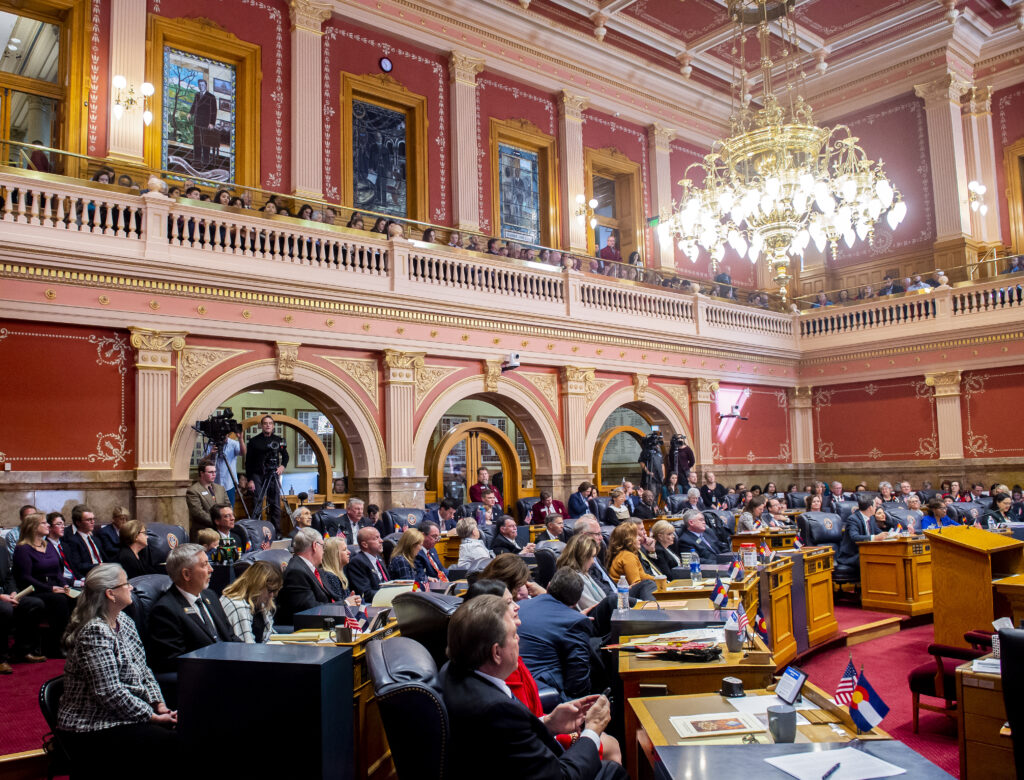Spending by outside groups alone for Colorado school board races exceeds $2 million
Outside groups trying to sway voters with mailers, phone calls and yard signs on the Colorado’s two most controversial school board elections have now spent more than $2 million, with more than $1 million spent in a little more than two weeks in October.
The spending has strongly favored pro-charter candidates in the races for four seats on the seven-member Denver Public Schools Board of Education, as well as pro-voucher candidates seeking four seats on the seven-member Douglas County Board of Education.
It’s almost all dark moneyWhat’s most notable about the spending of these outside groups is that almost every group falls under the definition of dark money. Open Secrets, which tracks election spending, defines dark money as “political spending meant to influence the decision of a voter, where the donor is not disclosed and the source of the money is unknown.” These donor organizations are usually cloaked under a “social welfare” or 501(c)4 designation granted by the Internal Revenue Service. Social welfare groups are restricted to spending no more than 49 percent of their total funds on political campaigns.
Denver Public SchoolsLeading the way: Raising Colorado, which has been the biggest spender between Oct. 12 and Oct. 30, with more than $525,000 spent in support of pro-charter school candidates in the DPS races. More than $100,000 of those expenditures were to back incumbent at-large member and former Lt. Gov. Barbara O’Brien. Raising Colorado is an independent expenditure committee, meaning it is prohibited by law from coordinating with the candidates the committee supports.
Raising Colorado is solely backed by Education Reform Now, which has so far contributed $625,000 between Aug. 1 and Oct. 30. The committee has spent more than $772,000 in the same time period.
Both Education Reform Now and an affiliated group, Democrats for Education Reform (DFER), were founded and are run by Wall Street hedge fund managers. Both groups are pro charter and favor ending teacher unions. DFER has directly contributed about $6,000 in recent weeks to DPS pro-charter candidates.
What’s at stake: control of the school board, which since 2010 has authorized 41 out of the district’s 60 charter schools and 42 of the district’s 49 innovation schools, which are similar to charters in that these schools obtain waivers from district policies, state statutes and collective bargaining agreements.
Better Schools of a Stronger Colorado (BSSC), another independent expenditure committee, spent $166,215 between Oct. 12 and Oct. 30. The committee, which also supports pro-charter school candidates, put all but $13,000 of those expenditures into backing O’Brien. The balance went to support Mike Johnson, an incumbent in District 3, which includes Park Hill on its north side and to just south of George Washington High School on its southern border.
BSSC is funded by Stand for Children, a Portland, Oregon-based education group that also advocates for charter schools and changing how teachers are evaluated. All of BSSC’s funding since Sept. 1, when most groups were taking in their biggest donations, came from Stand for Children, to the tune of $100,000 in cash and another $4,000 in non-monetary in-kind donations.
An independent expenditure committee backing the other side in the DPS race, Every Student Succeeds, spent more than $218,000 in the 18-day period. However, only $10,000 went to back one DPS candidate, “Sochi” Gaytan in District 2 (southwest Denver); the rest was spent to support candidates in two other school districts, Aurora and Arapahoe/Adams.
Brighter Futures for Denver has spent almost $161,000, all of it in support of anti-charter candidate Jennifer Bacon in District 4, which includes the Stapleton neighborhood and Montbello. The committee’s funding comes primarily from the Denver Classroom Teachers Association and the Colorado Education Association.
Douglas CountyBetween Oct. 12 and Oct. 30, the Colorado Republican independent expenditure committee put in $40,335 toward support for pro-voucher candidates in the Douglas County Board of Education race, one of the most watched school board races in the country. The IEC is not, however, a dark money group; most of its donors are well-documented and include $100,000 in August from the Anschutz Corporation (which owns ColoradoPolutics.com and The Gazette) and $100,000 from Pete Coors. The IEC also received $30,000 in August and September from the Independence Institute-affiliate Colorado Independent Action, neither of which discloses its source of funds. The Institute is doing its own “education campaign” to support school choice in Douglas County, at a cost of at least $35,000.
At stake in Douglas County is which side will control the board after the Nov. 7 election. Four seats, all held by pro-voucher conservatives, are up for grabs. Two slates of four candidates are running: one known as commUNITY that is anti-voucher, and another called Elevate Douglas County that has four pro-voucher candidates.
The winning side will get to decide the fate of the district’s controversial voucher program, which would give up to 500 district students $5,000 to attend private schools both in and out of Douglas County. According to the district’s website, any student can apply for a voucher. The website does not identify income as a criteria for a voucher, which makes it stand apart from voucher programs in other states, designed to help low-income students in failing schools. The Choice program was declared unconstitutional by the Colorado Supreme Court two years ago. The program is currently on hold, awaiting a U.S. Supreme Court-ordered review by the state Supreme Court.
On the anti-voucher side, the largest outside group spender is Douglas Schools for Douglas Kids, which spent $131,700 to support those candidates. Douglas County Parents, which largely provides in-kind support, spent just under $15,000. Funding for the Douglas Schools independent expenditure committee so far totals $415,000, with $300,000 of that coming from the American Federation of Teachers, which is affiliated with the teachers union in Douglas County.
Most notable in the past two weeks: a $15,000 donation to Douglas Schools for Douglas Kids from the Colorado Education Association, the state teacher’s union that does not include Douglas County. Another $100,000 to the Douglas Schools committee came from Citizens for Integrity, a dark money group that has in the past supported Democratic candidates for the General Assembly.
Bottom lineAs of Oct. 30, outside groups, except for the state GOP independent expenditure committee, have taken in $1.7 million. The GOP committee was excluded from the calculation since their funds go to a much wider variety of purposes than just the school board races.
The groups working on the Douglas County and Denver Public School board races have collectively spent $2.15 million, including $112,000 spent by the Colorado GOP independent expenditure committee on the Douglas County races. Don’t let the fact that there is more spending than contributing going on in the last week before the election throw you. That’s not unusual right before an election and usually means that post-election contributions are waiting in the wings.













